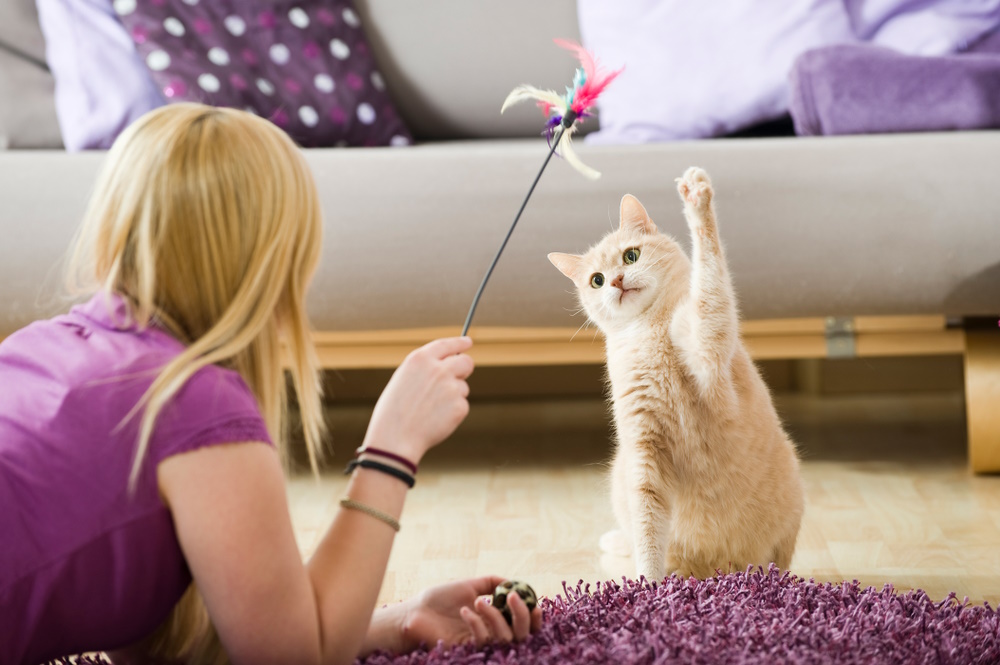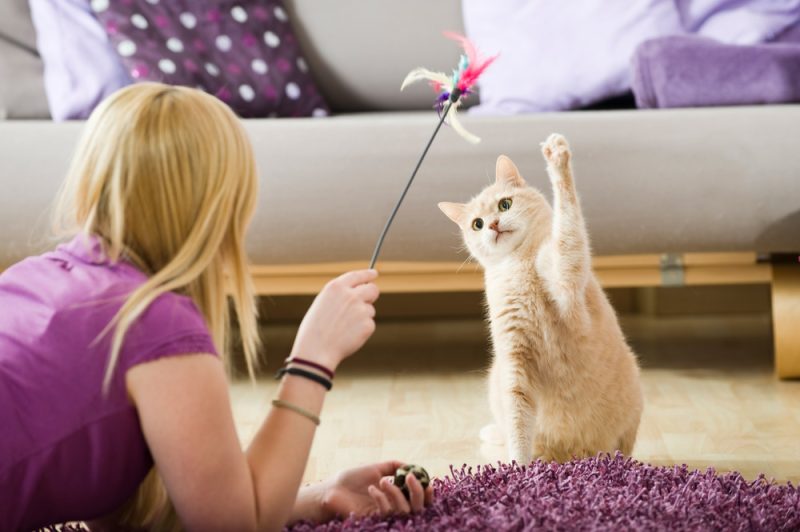As cat owners, we must care for our cats in every way: grooming them, feeding them, taking them to the vet, and giving them plenty of petting and cheek scratching.
But ensuring that they are happy and getting the right physical and mental exercises is absolutely paramount! This is what is known as enrichment, and there are so many ways that you can make sure your cat has enough of it.
These tips should help keep your cat entertained, which in the long run, will make your life easier and your cat’s even better!
The 14 Ways to Enrich a Cat’s Life
1. Get Boxes
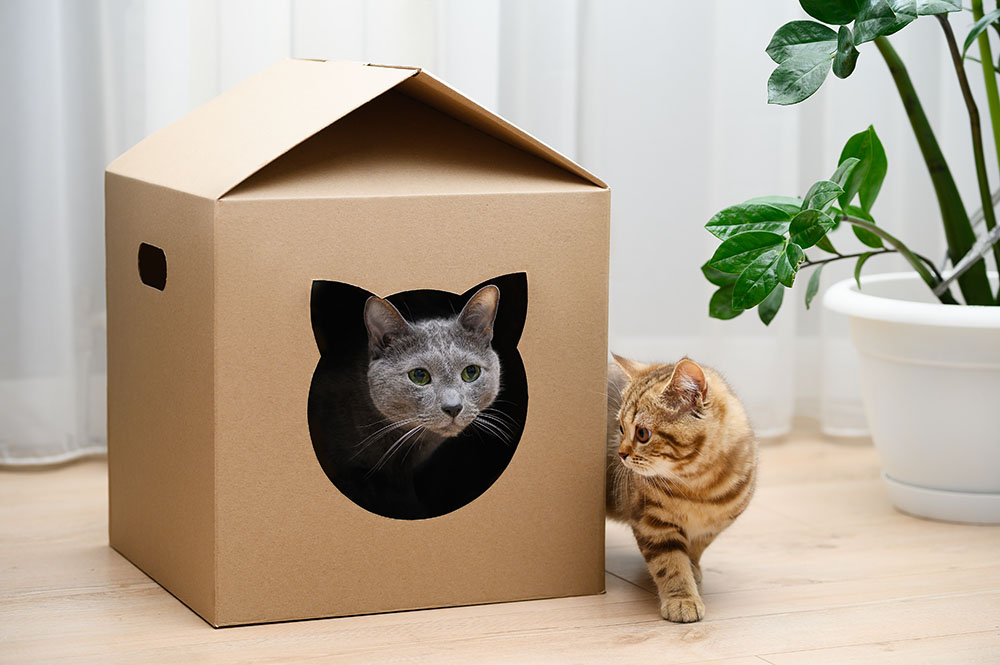
If you are a cat parent, you already know how much cats love boxes—just look at the famous box-loving cat Maru from Japan!
Having a bunch of boxes sitting around the house might not be everyone’s dream décor, but your cat will have a blast jumping in the boxes—and springing out when you walk nearby!
2. Invest in More Scratchers
posts, and different materials, such as cardboard and sisal rope.Needless to say, cats love and need to scratch, and they don’t care if they scratch your favorite chair. If you already have a scratching post, get a few more.
Give your cat options and variety, such as horizontal and vertical
3. Try Taking Your Cat for a Walk
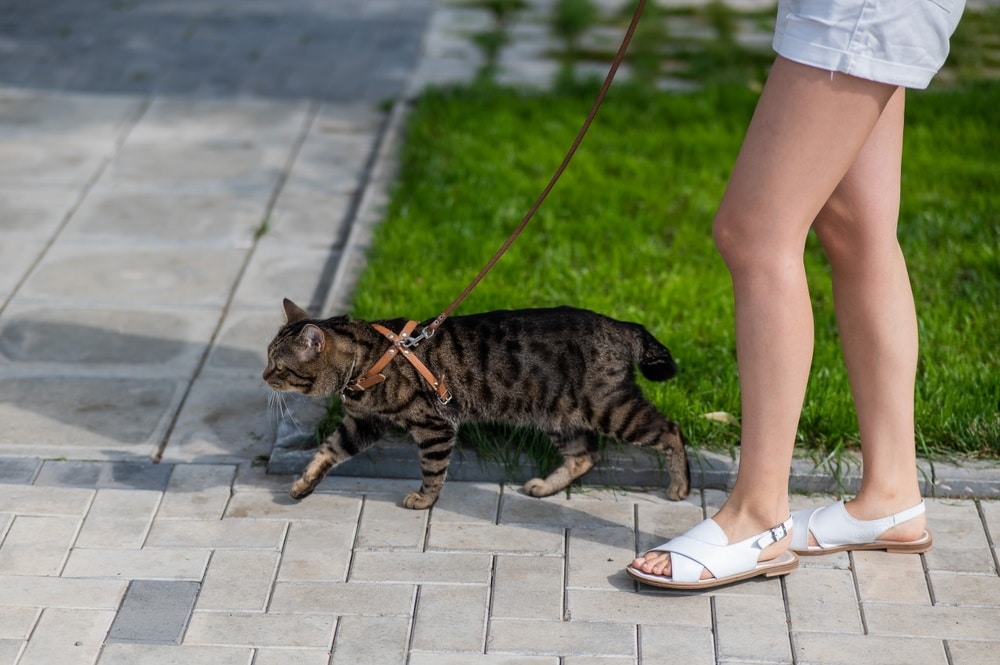
If your indoor cat has never been outside, take them out for a “walk” (which is more like a slow meandering for a feline). You should invest in a harness and leash made for cats, and you’ll need to work on getting your ca
However, keep in mind that not all cats will enjoy going outside for a walk, so pay attention to their body language, and don’t force them to do something that stresses them out.
4. Ensure That They Have Window Access
One of the best forms of entertainment for cats is watching the great outdoors. You can place a cat tree next to a window or invest in a perch to give your cat easy access to the window and a place to nap.
You can also consider setting up a bird feeder just outside the window for extra fun. In the warmer months, open it up (as long as you have a screen) so your cat can also breathe in the fresh air.
If a window seat is impossible, cat TV can keep your feline entertained. Just make sure they can’t hurt themselves by knocking over the TV.
5. Get a Tall Cat Tree
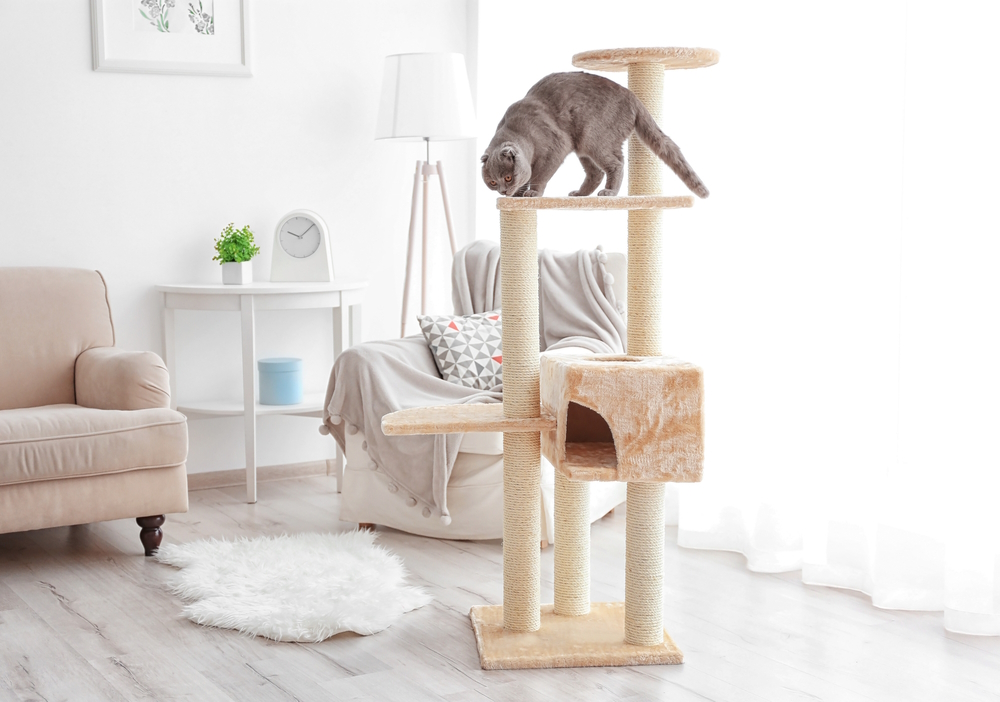
If you haven’t gotten a cat tree yet or even if you have one already, get a tall one, particularly if your current cat tree isn’t that high.
Cats love to rest in a high position, and cat trees also give them excellent scratching options and a place to nap and observe everyone beneath them.
6. Ensure That They Have a Cozy Cat Bed
The kind of bed that you invest in depends on your cat’s preferences. Some are enclosed and others are open. You can try out both kinds, or if you already know that your cat is prone to sleeping under blankets or other cozy materials, they might be more interested in cat cave beds.
7. Try Food Puzzles
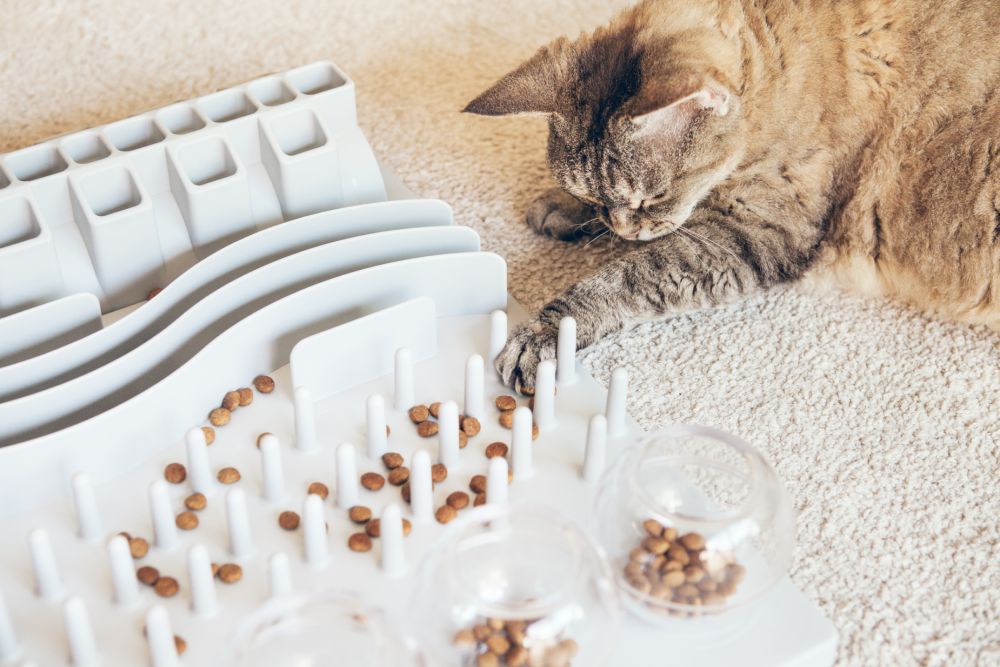
Food or treat puzzles can be everything from a treat-dispensing ball and an activity board to a lick mat. These items use treats that your cat will have to work hard to get to. Lick mats are a great place to put lickable treats, which most cats love.
All this makes for excellent mental exercise and keeps your cat busy for a while.
8. Set Up a Safe Yet Exciting Catio
Catios enable indoor cats to enjoy being outside safely. It can be an enclosure separate from the house in your backyard or attached to a window or door so your cat can come and go as they please.
This way, cats can enjoy the breeze, sun, grass, and enticing birds, and all are kept safe (except for the occasional unlucky bug).
9. Introduce New Toys

Keeping your cat’s toys fun and interesting can be accomplished by purchasing new ones from time to time. One method is to have enough toys that you can regularly rotate them. Perhaps once a month or so, swap out the toys in storage with the toys in the house.
You can also try different toys to keep things exciting for your cat. You’ll want ones that your pet can play with on their own, like cat springs and crinkle balls.
Additionally, get toys that you need to manipulate in order to play with your cat yourself, like fishing line toys and feather wands.
10. Try Catnip
This is definitely a fun option to try, but be aware that not all cats react to catnip. The response to catnip is genetically determined and appears to be a dominant trait. For those felines that are affected by it, you should know that the effects of catnip tend to wear off after about 10 to 15 minutes, and felines won’t react to catnip again until 30 minutes to an hour has passed.
Experts recommend only bringing it out occasionally. Be sure to keep it in a sealed container when not in use. You can also try silvervine for cats that don’t seem to react to catnip.
11. Give Cat Grass a Try
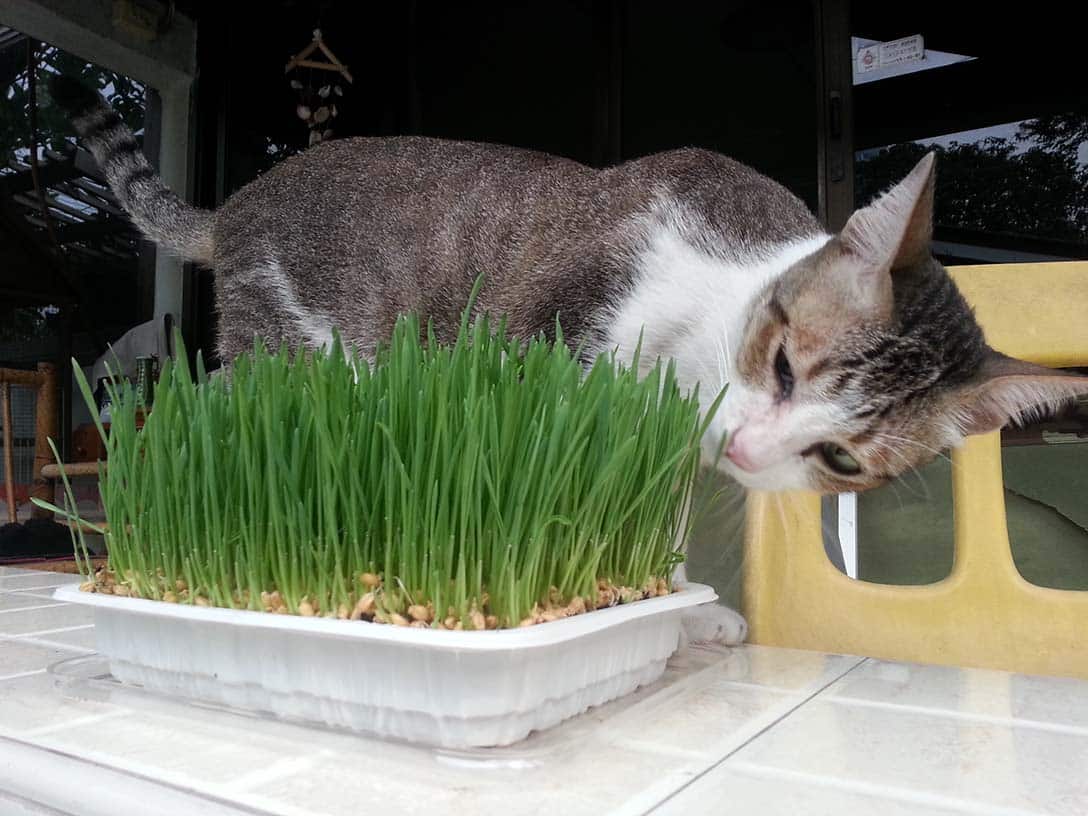
You’re in for a treat if you’ve never given cat grass to your cat! It typically comes in a kit with a planter, soil, and seeds.
It doesn’t take long to grow, and once the grass has sprouted, put it out for your cat and watch them chew on it. The seeds are usually a combination of things like rye, wheat, oats, and barley
12. Play Hide-and-Seek
Try playing hide-and-seek using treats or toys. Hide treats in a few places in your home, and watch your cat sniff them out.
You can also put toys under blankets and move them around like prey. This enables your cat to pounce, attack, and practice their hunting skills.
13. Teach Your Cat Tricks
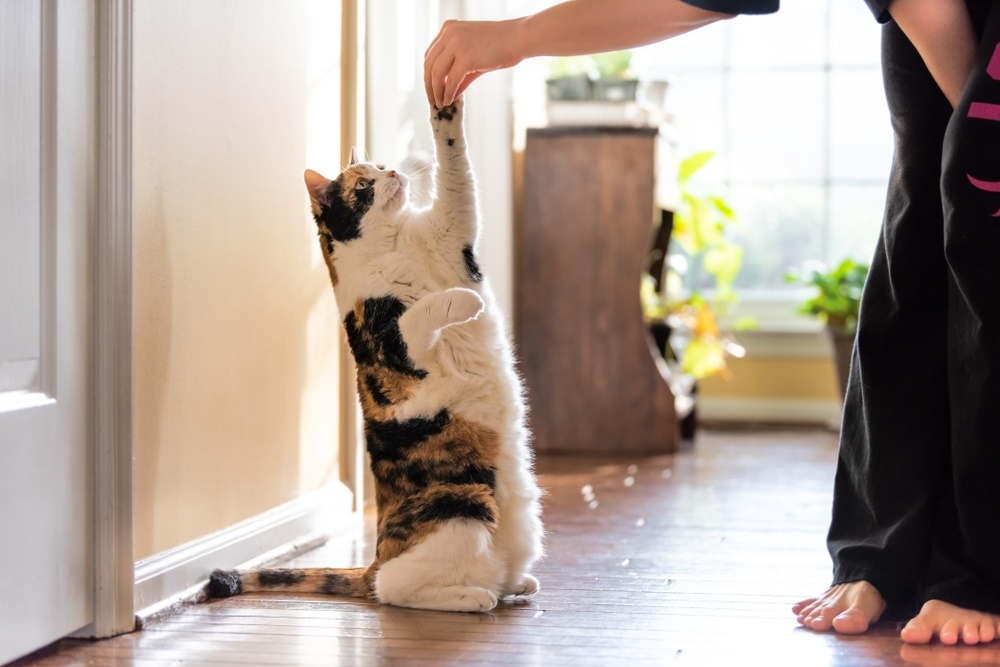
Some cats might not be interested in training, but it is a way to teach your cat tricks and build a stronger bond between you.
14. Spend Quality Time With Them
One of the most important ways to enrich your cat’s life is to spend time with them. If your cat enjoys being brushed, grooming sessions are ideal bonding moments with your kitty.
Quality time can also include a play session or just sitting on your couch with your cat purring on your lap. These activities will benefit you both!

Why Is Enrichment So Important?
Enrichment is vital for all cats but is particularly important for indoor felines. If you don’t give them toys to play with, scratching posts, or enough attention, you’ll have a frustrated and destructive kitty on your hands!
Cats need physical and mental stimulation, or they might become anxious and stressed, which can lead to health conditions. Bored cats can also develop behavioral issues due to stress, like house soiling, destructive scratching or overgrooming.
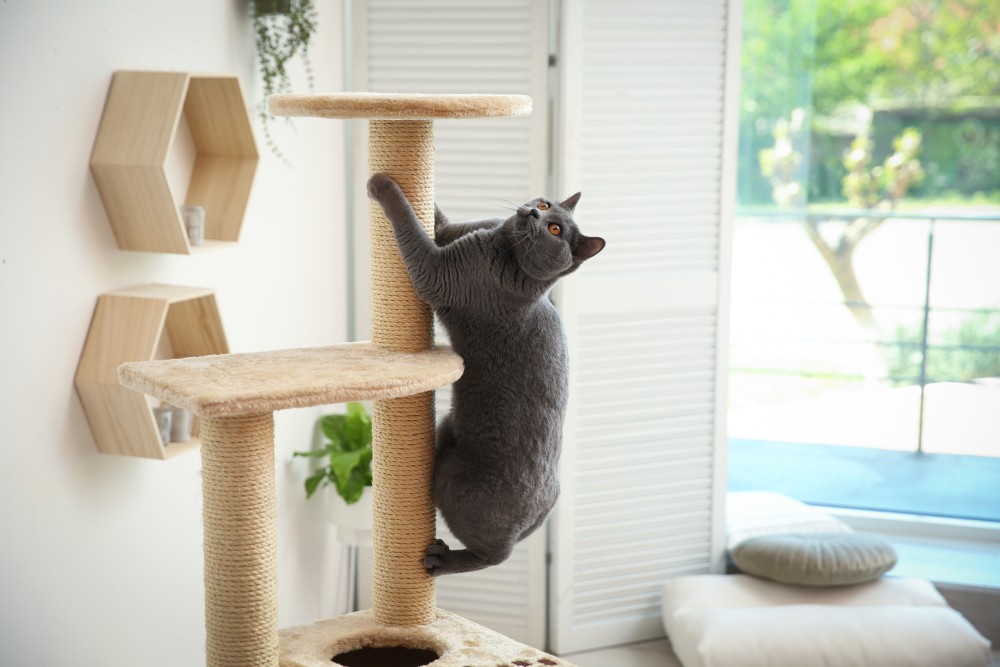
Conclusion
Enrichment is essential for every cat. All felines must have scratching posts, cat trees, access to windows, toys, and time spent with their owners. They also need time to sleep and groom, which they do frequently! So, read your cat’s body language, as this can help you determine if your cat is looking for pets, playtime, or just a long nap.
As long as you’re aware of how your cat is feeling and learn to understand them, you both should have a wonderful bond!
Featured Image Credit: Dora Zett, Shutterstock
Contents
- The 14 Ways to Enrich a Cat’s Life
- 1. Get Boxes
- 2. Invest in More Scratchers
- 3. Try Taking Your Cat for a Walk
- 4. Ensure That They Have Window Access
- 5. Get a Tall Cat Tree
- 6. Ensure That They Have a Cozy Cat Bed
- 7. Try Food Puzzles
- 8. Set Up a Safe Yet Exciting Catio
- 9. Introduce New Toys
- 10. Try Catnip
- 11. Give Cat Grass a Try
- 12. Play Hide-and-Seek
- 13. Teach Your Cat Tricks
- 14. Spend Quality Time With Them
- Why Is Enrichment So Important?
- Conclusion

